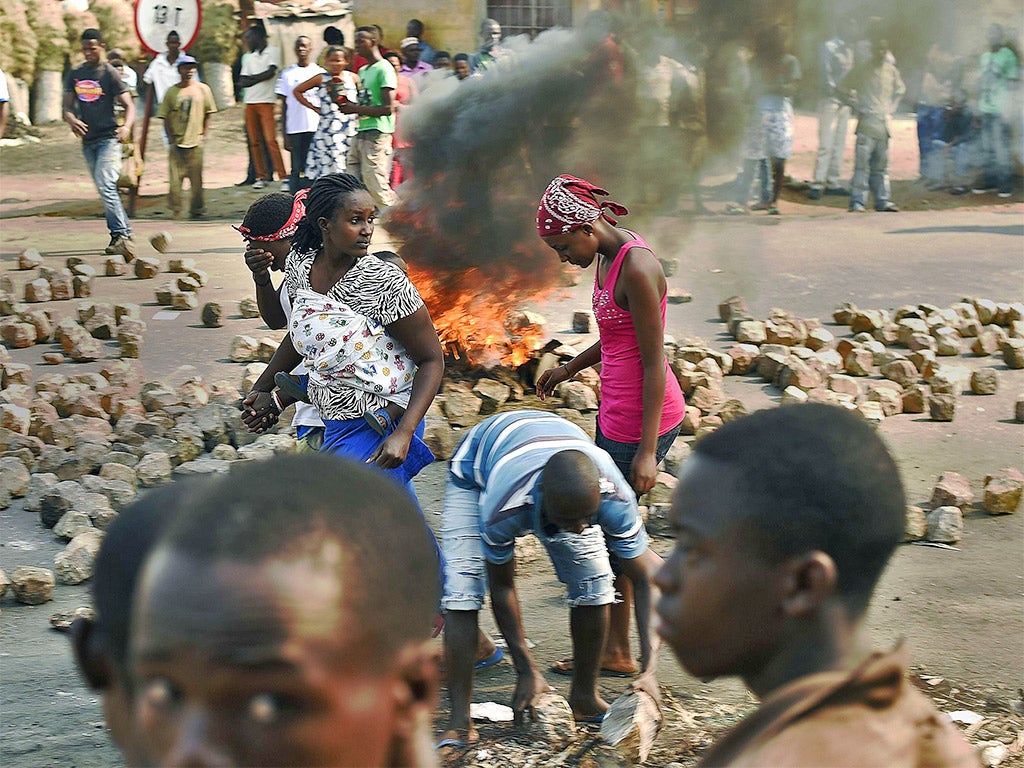Burundi election: Fears of 'chaos and uncertainty' grip East African nation following poll marked by killing and intimidation
President stages 'masquerade election' to secure a highly controversial third term in a country traumatised by its blood-thirsty past

Adidjan Datishiriye stood looking at the body. She shook her head. The opposition party member’s corpse lay on the streets of Nyakabiga, a district of the Burundian capital, as the East African nation prepared to hand its president, Pierre Nkurunziza, a third term in power.
The corpse was said to have been brought to Nyakabiga by car early this morning and dumped on the street. It was, as the troubled nation went to the polls after another night of fighting that also saw two police officers shot dead, a statement of intent. The 27-year-old Ms Datishiriye said: “Look, they are killing innocent people daily. How can we go and vote when the ruling party doesn’t respect the law?”
Those in neighbourhoods of the capital Bujumbura like Nyakabiga, that are subject to frequent patrols by security forces and the youth militia known as the “Imbonerakure”, say they turned up at the polls simply to avoid retribution from ruling party loyalists.
Burundi has been rocked by unrest since April when the ruling party announced Mr Nkurunziza would run for a third term. More than 100 people have died in protests against the president’s bid to extend his time in power. The strife triggered an attempted military coup in mid-May (see gallery below) that was quickly, and bloodily, put down by forces loyal to Mr Nkurunziza.
The US State Department said the election was not credible. “The legitimacy of the electoral process in Burundi over the past few months has been tainted by the government’s harassment of opposition and civil society members, closing down of media outlets and political space, and intimidation of voters,” said spokesman John Kirby. That intimidation was clearly evident. In Nyakabiga young men erected barricades similar to those set up during the protests that have rocked the east African nation in recent months to prevent the police from moving around Bujumbura. “We don’t want them to enter. When they pass through, they shoot at us. We can’t accept it,” said Rafael Manirakiza, 38.
At the otherwise empty voting bureau in Nyakabiga, one of the first voters of the day said he voted to avoid the powerlessness that comes with uncertainty. “It’s my right as a Burundian,” said the 27-year-old man who asked to remain unidentified. “I don’t sleep at night when they’re shooting. I’m always afraid. The aim of the shooting is to tell us not to go to the polls but in the morning I can wake up and still come, it’s all I can do. It’s what I have left.”
Results of what opposition candidates have called a “masquerade election” are expected later this week.
According to a supervisor for the electoral commission in Bujumbura, turnout was “very, very low”. The recent crisis has drawn parallels to Burundi’s ethnically charged civil war which resulted in the deaths of 300,000 Burundians and helped to spark the 1994 genocide of Tutsis in Rwanda. Mr Nkurunziza, 51, faced no strong electoral challenge.
In another district of the capital, Cibitoke, languid residents spent their voting holiday trading gossip with neighbours and largely avoiding the voting station. A group of middle-aged men playing basketball within sight of the polling bureau laughed at the notion that they would vote. “Come on,” one said, “These elections didn’t really happen. There is no election.”
Turnout and support for the president is expected to be higher in the rural provinces, where Mr Nkurunziza cast his own vote, but his supporters could be found at the polls in the capital as well. “For me, these are real elections,” said Desire Appollinaira, 53, at a polling station in Musaga commune. “Nkurunziza has done a lot, there is no war now. The opposition has done nothing.”
But the leading opposition candidate, Agathon Rwasa, of the FNL party told The Independent he fears the country will descend into “chaos and uncertainty” as mediations stall and international attention shifts away from the small nation after the election. “I’m very, very concerned. The government is waiting for these elections to be over and they will annihilate all those who are behind me. It will be a programme to annihilate my party and myself.”
Talk of politics has been overrun by rumour and paranoia recently but Mr Rwasa’s fears may be well founded given Burundi’s history. Over the last several months, human rights groups have documented ongoing extra-judicial killings, primarily in the communes that most anti-third term demonstrators call home. “We saw it in 2006 and in 2010. I can see it happening again, these executions,” said Mr Rwasa.
Opposition candidates boycotted the polls after five days of Ugandan-led mediation efforts failed to produce tangible results. Still, Mr Rwasa claims he will participate in the talks if they resume this week. “I don’t think there are any chances considering how the government has behaved but I will go,” he said. “The only way to prevent an escalation is dialogue. It’s obvious the government does not want dialogue.”
Subscribe to Independent Premium to bookmark this article
Want to bookmark your favourite articles and stories to read or reference later? Start your Independent Premium subscription today.

Join our commenting forum
Join thought-provoking conversations, follow other Independent readers and see their replies